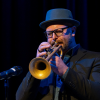Home » Jazz Articles » Album Review » Jared Hall: Seen on the Scene
Jared Hall: Seen on the Scene
For this session at Reed Ruddy's Studio X, he brought in iconic altoist Vincent Herring, a musical ally of his mentor Lynch, to delve into originals and covers with the dynamic aforementioned trio of Hansen, Glynn and Jorgensen.
The title track perhaps speaks to Hall's post-bop compositional prowess best, providing ample space for open, associative soloing, while demonstrating a writing style propped up solidly by bassist Glynn, and the intricate inner workings of Jorgensen's fine work. Hansen chips in with a keen, uncommon awareness, his comping often featuring left hand work which works in precise tandem with Glynn. The trio seems to bring out the best in the veteran Herring, his work utilizing more long tones mixed with his usual quicksilver runs. New melody after new melody seems to spring from the alto saxophonist's innate spontaneity, effectively shedding the skin of past endeavors and basking in the innovation which seems to have taken hold of Herring at this stage of his extensive career.
Hall really comes out to play on his take of Tadd Dameron's bop classic, "Mating Call." While scribes tend to compare his style to those of his most notable mentors, Lynch and Terence Blanchard, his style is more reflective than spontaneous, and settles into a personal narrative which tonally may refer more to Eddie Henderson or Donald Byrd. The tune swings hard, with Jorgensen and Glynn blazing the trail as they have so many times together on gigs in and around Seattle. Their "thing" is the catalyst which allows Herring to open up with a modernist twist which defines his approach to melodic improvisation. Jorgensen's slick solo that pushes the tune to its climatic finish, features intricate cymbal work, and subtle polyrhythms. Hall returns to Dameron's realm with two interpretations of "If You Could See Me Now," a piece written for the great Sarah Vaughn featuring the lyrics of Carl Sigman. Performed in duet with Hansen, Hall aptly describes the emotional essence of this fragile melody. Hansen, for his part, plays as if he is accompanying Ms. Vaughn herself, a role with which he is very familiar from performing with his wife, the vocal artist Kelly Johnson. Hall's approach to the tune conjures images of Vaughn's intimate relationship with the blues, mindfully rendering the lyrical emotion of Dameron's melodic premise.
When first scanning the roster of tunes on Seen on the Scene, seeing "Theme From Love Story" among Hall's originals initially lowered the "hiperature" to the chilly depths of questionable choice. As it turns out, Hall's arrangement and interpretation of the Francis Lai composition is indeed more than hip enough to be included. Glynn's strong solo intro ushers the melody like a force through an aperture, leading to Hall's beatific interpretation of the melody. Both bass and trumpet play with strength, as the rest of the band engages in a collective sense. Herring plays the countermelody, moving in and around Hall's clear, bold presence. Hansen's piano interlude denotes a freer approach to chamber jazz, in a sense a reflection of the entire piece. The tune represents a large and interesting contrast to the hard- swinging aspect of this band and this session, its leader and honored guest. Hall and Herring trade signatures going out, devising spacious, rhythmic passages which dance apart and inevitably find common ground.
Most of all, Seen on the Scene finds Hall in a more relaxed and mature state than on his formidable first effort, Hallways (Hollistic MusicWorks, 2017). Perhaps this can be attributed to fatherhood, to the emotional maturity which accompanies this major swing in life responsibilities. Then there is the hard work that pushes his trumpet prowess on an upward spiral. But, as he has found since breaking through in Seattle in 2017, community has its place at the center of positive change, a notion Hall has embraced from the start.
Track Listing
Seen on the Scene; Mating Call; Theme from Love Story; Thinker; Coral Way; If You Could See Me Now; Force for Good; Farewell; If You Could See Me Now.
Personnel
Jared Hall
trumpetVincent Herring
saxophone, altoJohn Hansen
pianoMichael Glynn
bass, acousticMatt Jorgensen
drumsAlbum information
Title: Seen on the Scene | Year Released: 2021 | Record Label: Origin Records
Tags
PREVIOUS / NEXT
Support All About Jazz
 All About Jazz has been a pillar of jazz since 1995, championing it as an art form and, more importantly, supporting the musicians who make it. Our enduring commitment has made "AAJ" one of the most culturally important websites of its kind, read by hundreds of thousands of fans, musicians and industry figures every month.
All About Jazz has been a pillar of jazz since 1995, championing it as an art form and, more importantly, supporting the musicians who make it. Our enduring commitment has made "AAJ" one of the most culturally important websites of its kind, read by hundreds of thousands of fans, musicians and industry figures every month.

























